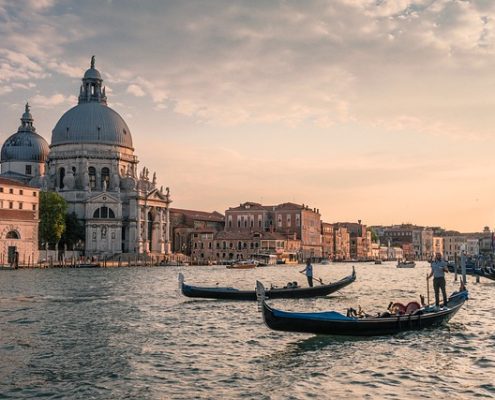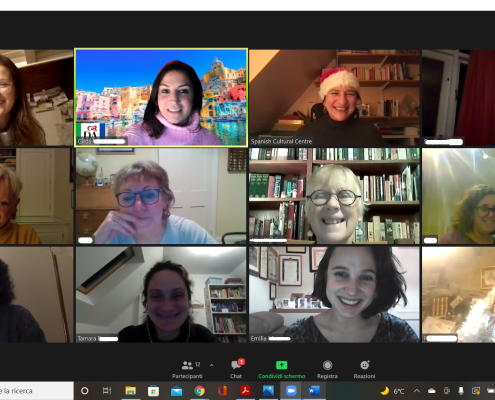Latest news at La Dante in Cambridge
Consult our blog to get latest news!

Moda Italiana: Preparati a sfilare con noi!
ItalianSei pronto a immergerti nel cuore pulsante della moda italiana, dove tradizione e innovazione s'intrecciano per dar vita a capolavori di stile che conquistano il mondo?
Lasciati guidare in un viaggio emozionante tra le icone intramontabili…

Discovering the Rich Tapestry of Spanish Culture
English, Italian, SpanishSpain is a country that mesmerizes with its rich traditions, stunning architecture, and mouthwatering cuisine. Journey with us through the vibrant and diverse aspects of Spanish culture, each telling its own captivating story.
The Melody of…

Exploring Italian Culture: From Ancient Rome to Pasta Perfection
English, ItalianItaly, with its rich history, captivating art, and mouthwatering cuisine, is a country that beckons
travellers from all corners of the globe. Let’s delve into the heart of Italian culture, uncovering its
unique characteristics and timeless allure.
Colosseum in Rome on a Sunny Day

LA DANTE IN CAMBRIDGE IS THE ONLINE & IN-PERSON LANGUAGE SKILLS SPECIALIST OF THE YEAR
English, Italian, SpanishAs reported on the IE 100 Magazine, La Dante in Cambridge, European Cultural Centre, has won the 2023 International Elite 100 Global Award and has been recognised as the Online & In-Person Language Skills Specialists of The Year.This…

CAN YOU AFFORD TO BE MONOLINGUAL IN THE GLOBAL ECONOMY?
English, Italian, Spanish, UncategorisedIn today's global economy, businesses are increasingly operating in multicultural environments, with companies conducting business with counterparts from different countries and cultures. In such a context, effective communication is crucial, and language barriers can significantly impact a business's success or failure. While it may be tempting to rely on English as a common language, can you afford not to speak the language of the country you work with?

Architettura Verde: 5 Esempi Tutti Italiani
ItalianIn occasione della 23esima edizione della Settimana della Lingua Italiana nel Mondo (dal 16 al 22 Ottobre 2023), che ha quest’anno particolarmente a cuore il tema della coscienza ecologica e della sostenibilità ambientale, La Dante in Cambridge vi propone 5 esempi di archiettura dal positivo impatto ecologico.
More aticles below





LA DANTE IN CAMBRIDGE AWARDED BEST LANGUAGE EDUCATOR 2023
English, Italian, SpanishLa Dante in Cambridge, European Cultural Centre, has been recognised as “Best Online & In-Person Language Educator 2023 . Cambridgeshire”.”Each year we look to celebrate those enterprises who consistently provide the best services and products for their clients, allowing them to stand out within their representative fields. – the Award organisers comment – The SME Business Elite Awardees for 2023 have been handpicked by SME News Magazine based purely on comprehensive research and analysis conducted by the wider group. This proven approach ensures that we award on merit, not popularity and recognise the very best in business. We award those SME’s that are succeeding in their endeavours, innovating, growing, and improving”.
The prize, to be awarded at the annual SME Business Elite Awards for 2023, represents the third acknowledgement after their two nominations in 2022 for the “Business Chameleon” and “Lockdown Leader”. In fact, it is with great pride that the cultural institute directed by Dr. Giulia Portuese, bestowed the Honour of Knight of the Order of the Star of Italy in 2021 by President Mattarella, celebrates this news which once again confirms the high quality of service offered every day by the dedicated and qualified teams at La Dante. For over 15 years, Cambridge’s European Centre has been offering courses in Italian, Spanish, and English language and culture which, having originally taken place in the famous university city, are now also held online and available to students around the globe. What sets them apart is their ever-growing team ranging from the Italian, Spanish, and English native teachers, all the way to the Marketing and Administration unit, coordinated by Marketing Manager Gilda Notarbartolo, all of whom show the utmost dedication to their work.
Giulia Portuese, Director La Dante in Cambridge
Dott.ssa Gilda Notarbartolo, Marketing Manager La Dante in Cambridge
“At La Dante in Cambridge, what distinguishes us is undoubtedly the strong passion we have for the dissemination of languages and culture, our work, and the respect that each member of La Dante reserves for those who share this interest by joining our family. This allows us to offer the best possible educational path to students of all ages and nationalities` – explains Giulia Portuese – Once again, I can say that efforts pay off and our multicultural family continues to grow more and more every day in the best way.”
Info: www.ladante-in-cambridge.org – info@ladante-in-cambridge.org – +447822010718
WHY ARE THERE SO MANY ITALIANS IN ARGENTINA?
English, Italian, SpanishIf you’ve ever been lucky enough to visit Buenos Aires, you might have wondered at times why it felt
as though you were stepping through the streets of Milan or Genoa. Many people comment on the
seeming lack of diversity throughout the nation, and once you notice it, it’s hard to ignore just how
much the demographic differs from the other Latin American countries. To understand the reasons for
this phenomenon, we have to go back a few centuries, specifically to start of the 16th century when
the colonisation of Latin America was in full force.
In 1502, about 10 years after the discovery of the
Americas, the Spanish set their sights on Argentina, but it wasn’t until 1516 that the mass migration to the region began. All over the continent thus far, there had been a significant prevalence of Spanish settlers, with Argentina being no exception.
Throughout the 1500s many conquistadors came and went, and Argentina was on the road to become as culturally and economically rich as its Latin neighbours; but without cohesion amongregions and a lack of support from Spain, this progress was short-lived. Fast- forward to the early
1800s; amid the Peninsular War when King Ferdinand VII was overthrown, this triggered a resistance not only in Europe, but also in the colonies around Latin America. Now without a King, the people living in the Spanish colonies decided it was best they ruled themselves, a desire that brought on the May revolution of 1810 or rather, the Argentine war of Independence. And in 1825, after years of military action and campaigns, (and help from the Chilean army) Argentina was made independent.
With their newfound independence came the opportunity for social and economic growth, and between the end of the 19th century and the start of the 20th, Argentina was experiencing just that, thus generating a strong demand for immigrants. The Argentine population at the time was only 1.1 million and, with the addition of newly acquired land from the war, there was a lot of space to be filled. Because of this, in the 1870s and 80s, the government decided to offer free and subsidised land to families as an incentive to bring over new citizens. Simultaneously, in Italy, with push factors such as overpopulation, poverty, political instability, and very limited economic opportunities (particularly in the southern regions) many Italians were driven to seek a better life abroad. This was the perfect exchange for both parties, and Italian immigrants arrived in large numbers seeking new opportunities
on Argentine soil. Argentina was one of the main destinations for Italian immigrants at that time – in fact it is estimated that between 1857 and 1940, more than 6 million Italians reached Argentina. They settled mostly in urban areas as well as establishing themselves in the farmlands, where they made significant contributions to the development of the countries, now renowned, agricultural sector. Upon their arrival, Italian immigrants naturally faced many challenges, starting with language barriers, they also had difficulties adapting culturally and experienced much discrimination as a result. Despite these initial hardships, they managed to establish a sense of community; they founded Italian newspapers, language schools and cultural organisations that helped preserve
their culture and facilitated the integration of Italians into Argentine society.
Argentine Republic, from Flags of All Nations, Series 1 (N9) for Allen & Ginter Cigarettes Brands
More:
View public domain image source hereOver time, Italian immigrants and their d
Over time, Italian immigrants and theirescen ddants blended into society, while maintaining strong ties with their geographical and cultural origins. Many Italians became entrepreneurs, artisans, and professionals, all of whom contributed to the growth of the urban middle class, legitimising their place in society. And of course, they brought their culinary traditions, art, music and even elements of the language to Argentina. Today, the Italian influence in Argentina persists; we see it in in the popularity of Italian cuisine, the architecture, the prevalence of Italian surnames and a widespread of the Mediterranean customs and values embedded in Argentine culture. Argentina is now the country with the largest Italian presence, after Italy of course, and Italian culture is so deeply rooted that it has become a huge part of Argentine Identity. The population of Italo-Argentines, according to various studies, 25 million people and it is the first ethnic group in a South American country that makes up more than 50% of the population.
It’s fair to say that Italian immigration has shaped the demographic composition, economy, and cultural identity in Argentina; Italian influence is perhaps the most prevalent within the cultural melting pot that is Argentina and has most certainly left a deep and lasting impact on the country.
Christina Usuanlele
The best movies and songs to learn and improve your Italian
English, ItalianItalian Movies for Language Learners
1. “La Vita è Bella” (Life is Beautiful) is a heartwarming comedy-drama film. The story is about a father who uses his humor to protect his young son from the harsh reality of life in a Nazi concentration camp. The film is easy to follow and features a charming performance by Roberto Benigni.
Italian Songs for Language Learners
How to learn Italian fast? Check out La Dante in Cambridge, European Cultural Centre. The native professional teachers at La Dante use the Communicative Approach. This is one of the most effective ways to learn a new language based on immersive language learning. La Dante tutors offer online group and individual classes. Online and face-to-face individual tuition; as well as long-term and intensive courses.
For more information, mailto:italian@ladante-in-cambridge.org or phone/WhatsApp +447887606227.
7 secrets to learn Italian you need to know
English, ItalianWhen it comes to learn a new language, we can feel overwhelmed. Will it be hard to go back to study? Will I have enough time to dedicate to it during my hectic days? Is Italian too different from my own mother tongue?
Italian is such a beautiful and poetic language linked to a culture we love or that we want to know better. So we deserve to learn it!
The true good news is that you can learn it at any age, and it is easy.
I guess this explains why over 230 million people in the world study Italian. The right program will make you learn this splendid language if you want it. Here I will tell about 7 simple tips you can follow to make it faster than what you think.
What is the best way of learning Italian?
Italian, even with its fascinating complexities, is an easy language for English speakers. Its vocabulary, as a matter of fact, is quite close to many English words. Think of vocabulary such as “jogging”, “finale”, “feeling”, “diva” “shock”, “melodia”, “poeta” .
How to learn Italian fast? Check out La Dante in Cambridge, European Cultural Centre. The native professional teachers at La Dante use the Communicative Approach. This is one of the most effective ways to learn a new language based on immersive language learning. La Dante tutors offer online group and individual classes. Online and face-to-face individual tuition; as well as long-term and intensive courses.
For more information, mailto:italian@ladante-in-cambridge.org or phone/WhatsApp +447887606227.
Can you run a business without foreign languages?
EnglishHave you ever got in trouble in the workplace because of some miscommunication caused by cultural differences? Misunderstandings sometimes are caused by cultural differences and language barriers, while being able to speak a language is not equal to fully understanding
a language. It might sound a bit tricky and complicated as you might be questioning why has the person become cold or not reacted the way you wanted. Did you lose a deal or was there awkwardness during the meeting?
Understanding business culture – will this make a difference for your business?
We easily get confused with the business norms if we are not familiar with the local cultures when doing business internationally. Let’s take negotiation skills as examples, the ways people negotiate, view and interpret the negotiation process, closely vary among local cultures.
For instance, from a Chinese perspective, negotiations exist primarily as a mechanism for building trust so that two parties can work together for the benefit of both. In business meetings or other situations, you want to build up the relationship and avoid embarrassing or even raising your glass above your Chinese guest. What is disrespectful to Chinese culture? Do not touch, hug, lock arms, back slap or make any body contact. Furthermore, clicking fingers or whistling is considered very rude. Never put your feet on a desk or a chair, and Never gesture or pass an object with your feet. Blowing one's nose in a handkerchief and returning it to one's pocket is considered vulgar by the Chinese.
If you deal with German business people instead, always show data and analytics above all.
It can come as a surprise for some of us that, from a Japanese perspective,
“Yes” doesn’t mean “Yes”, it means I understand instead due to its disciplined social system.
So it is crucial to take into consideration that cultural differences may result in misunderstandings when doing business. Moreover, Japan is a more relationship-oriented culture than countries such as Australia, particularly when it comes to doing business. Japanese want to know and trust someone before they do business with them. Relationships are developed through informal social gatherings and generally involve a considerable amount of eating and drinking. I would say that it’s the same if you wish to build up a work relationship in Italy or Spain.
If you are meeting Italians, always make sure you invite them to a good restaurant. It’s important for Italians to build a trust prior to doing business. Relationships are very important in Italian business culture. In the ‘Bel Paese, business people want to be familiar with their business contacts, so I suggest you work with a local representative to arrange introductions and appointments before your trip. Italians expect formality. When meeting contacts for the first time, address them a “Signor(e)’ (Mr.)” or “Signora’ (Mrs.),” with their surname. Wait until you’re invited to use their first name in subsequent meetings to be safe. It’s important to show respect for elders, people in positions of authority and people with professional titles such as “Dottore/ Dottoressa (Doctor).” Italian companies often employ a horizontal chain of authority, called “cordata” (which literally translates to a team of mountain climbers on the same rope). To fully understand this concept, maintain a good relationship with contacts who can educate you on theinternal structure of the companies you wish to do business with. Also, bear in mind that anticipate those negotiations often take time. Trying to rush the process or conveying urgency can weaken your bargaining position. For all these reasons we have to be very cautious of how different cultures behave during meetings
and deals can be facilitated overseas. Apart from negotiation skills, being able to express your opinions and writing business
reports are also very important. Having proficient language skills help you overcome early difficulties in the workplace. B2 Business Vantage exam qualification can demonstrate that you are capable of doing business tasks in business English as it is a globally recognised exam. This test, in fact, is one of the three Cambridge English Qualifications for business exams. Each of them is targeted at a different level. B2 is a middle level, which shows employers that you are ready to work successfully with international business companies.
The content for the exam is based on real everyday work and business tasks and is designed to develop your business English skills. By getting a B2 certificate, you will improve your career opportunities and easily be accepted globally by top international companies. According to statistics, employees are 18% more likely to have a faster progression than their peers, while 17% more likely to have pay rises.
Sharing our experience with you
One of our business students Leon, a senior engineer at Qualcomm, in charge of developing Ads and writing code, did his online preparation for the B2 Business Vantage exam at La Dante in Cambridge. When the course started, our business English trainer Alexis immediately
got to know his background, including his English level and the goals he wanted to achieve. So, Alexis started preparing teaching material to improve Leon’s skills, and realised that being Chinese he needed to be introduced to small talk that is
something British love prior to starting a business conversation. It was really interesting to see how Chinese and British need to learn on simple sentence building that makes them comfortable during the meeting. English business culture was introduced with real-life examples, and Leon’s presenting and communication skills greatly advanced. As language learning is of high importance for export as well as for establishing businesses overseas, at La Dante in Cambridge we pride ourselves of having taught highly regarded firms since 2010: Birkets, Qualcomm, ETT Solutions, and Corepixx among others with promoting business, and language culture in Italian, Spanish and English.
Article written by Dott.ssa Giulia Portuese, Director and founder at La Dante in Cambridge
and contribution from Alexis Loizou, English teacher for professionals
La festa di Halloween e le sue origini celtiche, romane e cristiane
ItalianLa festa di Halloween comunemente celebrata il 31 ottobre in Inghilterra, negli Stati Uniti e in molti Paesi del mondo, è ormai divenuta molto popolare anche in Italia con il celebre rito del “dolcetto o scherzetto” ( “trick or treat”). La notte tra il 31 ottobre e il 1 novembre gruppetti di bambini mascherati, spesso accompagnati dagli adulti, passano di abitazione in abitazione a chiedere dolcetti e caramelle. Questo aspetto assolutamente goliardico è trasformato spesso in organizzazione di eventi e feste a tema, per adulti e bambini che programmano serate eccezionali per il cosiddetto “Ponte di Ognissanti” (anche detto “ponte dei morti”).
Ma da dove ha origine questa tradizione? Halloween nasce in Irlanda tra le popolazioni celtiche. In origine, infatti, era il Samhain, conosciuto come Capodanno Celtico, festa pagana per celebrare la fine dei raccolti e l’inizio della stagione fredda risalente al VI secolo a.C. Questo era considerato un tempo liminale, in cui il confine tra il mondo dei vivi e quello dei morti poteva essere oltrepassato facilmente. La leggenda narra, infatti, che durante queste feste, gli spiriti dei morti si aggirassero per le campagne irlandesi in compagnia di streghe e fantasmi. Samhain univa dunque la paura della morte e degli spiriti all’allegria dei festeggiamenti per l’arrivo del nuovo anno.
Anche se i Celti arrivarono cronologicamente dopo il popolo Romano, le affinità tra i loro rituali emersero tardi. I Romani riconobbero nelle liturgie dei Celti una certa affinità con le celebrazioni dei Lemuria e i Parentalia. Queste ultime erano rituali popolari in cui gli spiriti dei morti venivano placati, esorcizzati.
Successivamente, nel 609, papa Bonifacio IV istituì la festa di Ognissanti, celebrati a maggio durante i festeggiamenti dei Lemuria romani, ma nel V secolo papa Gregorio III la spostò al 1°novembre, così da contrapposta al Samhain celtico. Si tratta di una tattica ricorrente della tradizione cristiana: festa pagana ricoperta con una nuova festa riconsacrata alla religione cristiana. Tuttavia, con la Riforma luterana la festa voluta dal papa smise di esser celebrata nei territori protestanti. Tolto il velo cristiano, la festa tornò pagana e laica arrivando fino all’Halloween che conosciamo oggi, con le sue usanze grottesche e simboli macabri.
In sintesi, ciò che festeggiamo oggi il 31 di ottobre è un mix di tradizioni: celtiche, romane e cristiane. Il nome Halloween deriva da una contrazione scozzese settecentesca dell’inglese Allhallow’s-even che significa Vigilia di Ognissanti, dove Hallow è una parola arcaica che significa Santo.
Nonostante oggi Halloween sia comunque una festa che deriva dal mondo anglosassone, è diventata parte della cultura anche italiana. Da tradizione, chi non si veste da strega o da demone per la notte più misteriosa dell’anno?
E voi, cosa farete ad Halloween?
Sofia Bianchi